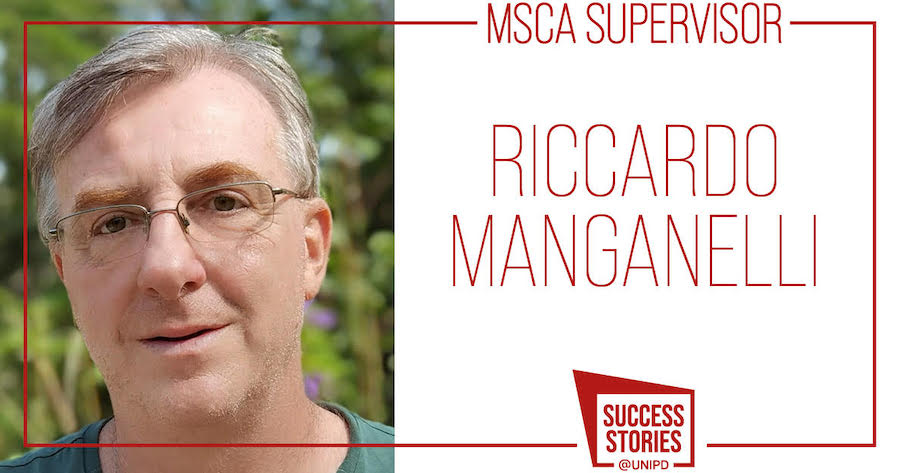
MSCA Supervisor: Riccardo Manganelli
What impact do EU-funded projects have on a researcher’s career?
Riccardo Manganelli is Full Professor at the Department of Molecular Medicine - University of Padua. He has been involved in several EU-funded research projects, and he is currently a supervisor of a MSCA Individual Fellow. EU-funded projects gave him not just a consistent budget for his research activities but also the possibility to “meet several other scientists, discuss with them, elaborate ideas together and initiate several collaborations, thus growing up scientifically”.

Riccardo Manganelli studied at the University of Siena and did his PhD at the University of Genova. He worked as Research Associate in the US for five years and then came back to Italy, first as Associate Professor and then as Full Professor at the University of Padua, where he established his own research group.
Prof. Manganelli is the supervisor of Agnese Serafini, a MSCA Fellow who is exploring how the variations of metal availability (mimicking the mechanisms of innate immune cells), like iron and manganese, affect the activity of central metabolism in M. tuberculosis and Mycobacterium abscessus.
Prof. Manganelli, you are the supervisor of Agnese Serafini, a researcher who has recently been awarded a MSCA Individual Fellowship for the project “Myco_Metabolism: How iron and manganese affect the central metabolism in pathogenic mycobacteria”. Why did you decide to support Agnese in her application? How did you meet her? How did you come up with the proposal idea?
Agnese worked with us for a few years, then she found a position at the Crick Institute and spent five years in London. About one year and half ago, she moved back to Italy and started to work for a Biotech company, but she contacted me to know if I would be interested in supporting her for an MSCA Individual Fellowship. Of course, I was very happy; both because I knew her love and enthusiasm for research and because she proposed me collaborate on a project on the metabolomics of Mycobacterium tuberculosis. I have been working on the genetics and physiology of this bacterium for more than 20 years, but I never used metabolomics, so I thought that it would be a good opportunity to introduce this important expertise in our lab.
The MSCA Individual Fellowships are intended to be training-through-research projects. Can you tell us what is the role of a MSCA supervisor in this kind of actions?
The main goal of a MSCA project is to help the Fellow reach complete scientific independence, so I think that the main role of a MSCA supervisor is to give the maximum freedom to the Fellow, and be always available for discussing the data and changes in the experimental plan that may arise from the scientific findings.
What are the main lines of research at your lab? How many people are working in it? What do you and your lab have to offer to a postdoctoral researcher?
As already mentioned, we work on Mycobacterium tuberculosis, a major human pathogen responsible for tuberculosis. At this regards our main expertise is the study of transcriptional regulation in response to stress. We study how mycobacterial cells react to defend themselves from harmful changes in the environment they may encounter during infection. Of course, the final goal is to find their Achille’s hill to develop new drugs. At the moment, we are also developing a new assay based on granuloma-like structures to evaluate the efficacy of new antimycobacterial drugs. Basically, we want to reproduce in vitro the macrophage/lymphocytes agglomerates (granulomas) constituting the natural response of our body for containing mycobacterial growth and dissemination during infection in order to select new drugs able to penetrate them and reach the bacteria efficiently.
Our group is not large, we are seven people: two faculties, three PhD students and two post-docs. Of course, we also have several Master students who rotate to do their Thesis (usually two or three).
Regarding the last question… probably you should ask the post-docs! Anyway, what I hope is I am being able to offer a very friendly and constructive environment where people feel comfortable and work in full collaboration. Post-docs and PhD students spend so much time in the lab that I think this is an essential point to help them concentrate on work and grow up. Additionally, I hope to offer them the opportunity for developing a very strong expertise in Bacteriology by working with one of the most difficult and dangerous bacteria. I try to support them in reaching their scientific independence through their direct involvement in the decision-making process. Last but not least, given our participation to several European projects, I can offer continuous and intense exposure to contacts with several scientists from other European (and extra-European) countries.
You have been engaged in several EU-funded research projects. How did they impact your career? Do you think that being a MSCA supervisor can bring some added value to your career too?
They had an enormous impact on my career for two main reasons. First because international projects gave me about 9/10 of my budget during the last ten-fifteen years, so they allowed me to work. Second, through these projects I could meet several other scientists, discuss with them, elaborate ideas together and start several collaborations, thus growing up scientifically.
Supervising a MCSA fellow can be an added value because it can give the opportunity to help a young colleague to grow up and at the same time bring her/his expertise to the lab.
What tips would you like to share with a researcher who is thinking of applying for an international research project?
Go to meetings (of course when the COVID-19 will allow it…), talk to people, share ideas, be always very enthusiastic about your work…I think the main point is to have a large network of colleagues that trust and esteem both you and your expertise. They will most likely invite you to join their proposal or accept to contribute to yours.
International Research Office
via Martiri della libertà 8, 35137 Padova, Italy
tel. +39 049.827 1947 / 1948 / 1945
fax +39 049.827 1911
international.research@unipd.it


